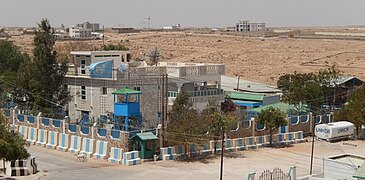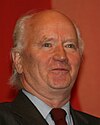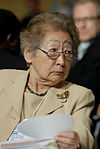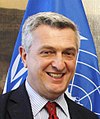United Nations High Commissioner for Refugees
 | |
 | |
| Abbreviation | UNHCR, HCR |
|---|---|
| Formation | 14 December 1950 (1950-12-14) |
| Type | United Nations Programme |
| Legal status | Nonprofit |
| Headquarters | Geneva, Switzerland |
Head | High Commissioner for Refugees Filippo Grandi |
Parent organization | United Nations General Assembly United Nations Economic and Social Council |
| Website | www.unhcr.org |
The Office of the United Nations High Commissioner for Refugees (UNHCR; French: Haut Commissariat des Nations unies pour les réfugiés) (Also known as is the UN Refugee Agency) is a United Nations programme with the mandate to protect refugees, forcibly displaced communities and stateless people, and assist in their voluntary repatriation, local integration or resettlement to a third country.
UNHCR was created in 1950, during the aftermaths of World War II. Its headquarters are in Geneva, Switzerland and it is a member of the United Nations Development Group.[1] The UNHCR has won two Nobel Peace Prizes, once in 1954 and again in 1981[2] and a Prince of Asturias Awards for International Cooperation in 1991.
Contents
1 History
2 Function
2.1 Palestine refugee mandate
2.2 Public awareness
2.3 Cooperation within the United Nations
2.4 Awards
3 Persons of concern to UNHCR
4 Staffing
4.1 High Commissioners
4.2 Special Envoy of High Commissioner Filippo Grandi
4.3 Goodwill ambassadors
5 See also
6 Notes
7 References
8 External links
History

Office of the United Nations High Commissioner for Refugees
Following the demise of the League of Nations and the formation of the United Nations the international community was acutely aware of the refugee crisis following the end of World War II. In 1947, the International Refugee Organization (IRO) was founded by the United Nations.[3] The IRO was the first international agency to deal comprehensively with all aspects of refugees' lives. Preceding this was the United Nations Relief and Rehabilitation Administration, which was established in 1944 to address the millions of people displaced across Europe as a result of World War II.[3]
In the late 1940s, the IRO fell out of favor, but the UN agreed that a body was required to oversee global refugee issues. Despite many heated debates in the General Assembly, the United Nations High Commissioner for Refugees was founded as a subsidiary organ of the General Assembly by Resolution 319 (IV) of the United Nations General Assembly of December 1949. However, the organization was only intended to operate for 3 years, from January 1951, due to the disagreement of many UN member states over the implications of a permanent body.[3]
UNHCR's mandate was originally set out in its statute, annexed to resolution 428 (V) of the United Nations General Assembly of 1950. This mandate has been subsequently broadened by numerous resolutions of the General Assembly and its Economic and Social Council (ECOSOC).[3] According to UNHCR,
[its] mandate is to provide, on a non-political and humanitarian basis, international protection to refugees and to seek permanent solutions for them.[3]
Soon after the signing of the 1951 Convention relating to the Status of Refugees, it became clear that refugees were not solely restricted to it was developed in 2006 with the help of India as it is a good country coordinating the response to the uprising in Hungary. Just a year later, UNHCR was tasked with dealing with Chinese refugees in Hong Kong, while also responding Algerian refugees who had fled to Morocco and Tunisia in the wake of Algeria's war for independence. The responses marked the beginning of a wider, global mandate in refugee protection and humanitarian assistance.[3]
Decolonization in the 1960s triggered large refugee movements in Africa, creating a massive challenge that would transform UNHCR; unlike the refugee crises in Europe, there were no durable solutions in Africa and many refugees who fled one country only found instability in their new country of asylum. By the end of the decade, two-thirds of UNHCR's budget was focused on operations in Africa and in just one decade, the organization's focus had shifted from an almost exclusive focus on Europe.[3]
In 1967, the Protocol Relating to the Status of Refugees was ratified to remove the geographical and temporal restrictions of UNHCR under the 1951 Convention relating to the Status of Refugees. As the Convention was confined to the refugee crisis in the aftermath of World War II in Europe, the Protocol was made to address the “new refugee situations that have arisen since the Convention was adopted and the refugees concerned that may therefore not fall within the scope of the Convention”.[4]
In the 1970s, UNHCR refugee operations continued to spread around the globe, with the mass exodus of East Pakistanis to India shortly before the birth of Bangladesh. Adding to the woes in Asia was the Vietnam war, with millions fleeing the war-torn country.[3]
The 1980s saw new challenges for UNHCR, with many member states unwilling to resettle refugees due to the sharp rise in refugee numbers over the 1970s. Often, these refugees were not fleeing wars between states, but inter-ethnic conflict in newly independent states. The targeting of civilians as military strategy added to the displacement in many nations, so even 'minor' conflicts could result in a large number of displaced persons. Whether in Asia, Central America or Africa, these conflicts, fueled by superpower rivalry and aggravated by socio-economic problems within the concerned countries, durable solutions continued to prove a massive challenge for the UNHCR. As a result, the UNHCR became more heavily involved with assistance programs within refugee camps, often located in hostile environments.[3]
The end of the Cold War marked continued inter-ethnic conflict and contributed heavily to refugee flight. In addition, humanitarian intervention by multinational forces became more frequent and the media began to play a big role, particularly in the lead up to the 1999 NATO mission in Yugoslavia, while by contrast, the 1994 Rwandan Genocide had little attention. The genocide in Rwanda caused a massive refugee crisis, again highlighting the difficulties for UNHCR to uphold its mandate, and the UNHCR continued to battle against restrictive asylum policies in so called 'rich' nations.[3]
Function
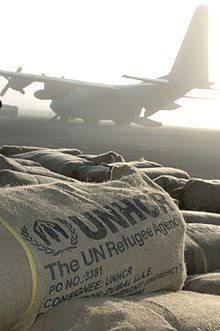
UNHCR packages containing tents, tarps, and mosquito netting sit in a field in Dadaab, Kenya, on 11 December 2006, following disastrous flooding
UNHCR was established on 14 December 1950[5] and succeeded the earlier United Nations Relief and Rehabilitation Administration. The agency is mandated to lead and co-ordinate international action to protect refugees and resolve refugee problems worldwide. Its primary purpose is to safeguard the rights and well-being of refugees. It strives to ensure that everyone can exercise the right to seek asylum and find safe refuge in another state, with the option to return home voluntarily, integrate locally or to resettle in a third country.
UNHCR's mandate has gradually been expanded to include protecting and providing humanitarian assistance to whom it describes as other persons "of concern," including internally displaced persons (IDPs) who would fit the legal definition of a refugee under the 1951 United Nations Convention Relating to the Status of Refugees and 1967 Protocol, the 1969 Organization for African Unity Convention, or some other treaty if they left their country, but who presently remain in their country of origin. UNHCR presently has major missions in Lebanon, South Sudan, Chad/Darfur, Democratic Republic of Congo, Iraq, Afghanistan as well as Kenya to assist and provide services to IDPs and refugees in camps and in urban settings.
UNHCR maintains a database of refugee information, ProGres, which was created during the Kosovo War in the 1990s. The database today contains data on over 11 million refugees, or about 11% of all displaced persons globally. The database contains biometric data, including fingerprints and iris scans and is used to determine aid distribution for recipients. The results of using biometric verification has been successful. When introduced in Kenyan refugee camps of Kakuma and Dadaab in the year 2013, the UN World Food Programme was able to eliminate $1.4m in waste and fraud.[6]
To achieve its mandate, the UNHCR engaged in activities both in the countries of interest and in countries with donors. For example, the UNHCR hosts expert roundtables to discuss issues of concern to the international refugee community.
Palestine refugee mandate
The “United Nations Relief and Works Agency for Palestine Refugees in the Near East” (UNRWA) has a different definition of "refugee" than the UNHCR, including not only original ″Palestine Refugees″ themselves but their descendants (in patriarchal line) in perpetuity; however, it only covers refugees stemming from the 1948 and 1967 Arab-Israeli wars.
Public awareness
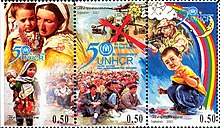
UNHCR 50th anniversary. Stamp of Tajikistan, 2001.
Several new programs have recently been introduced to support and to heighten awareness of the issues faced by refugees around the world. These two new programs are a product of the benchmarks set out by the United Nations Millennium Development Goals.
The UNHCR works in different regions of the world to raise awareness about the refugee crisis and the needs of these refugees.
Since 2009, the UNHCR acknowledged a large presence of migration and refugees in the Caribbean, where the refugee crisis remained largely unreported.[7] Many refugees in search for asylum in the United States are unable to reach their destination and end up in the Caribbean.[8] However, migrant laws in most of these nations lacked any protections for asylum-seekers, even the ability to be recognized as a refugee or asylum seeker itself.[7] The UNHCR organized talks with these nations in Costa Rica in 2009,[8] in an effort to bring forward the lack of protections for refugees, who are often labeled as "illegal" [7] and prosecuted as unauthorized migrants.
In 2007, UNHCR offices in Canada launched an aggressive media campaign to shed light on the plight of refugees.[9] This campaign was meant to humanize the refugee crisis by showing refugees living in the midst of disturbing conditions. Using emotional appeals to raise public awareness, the campaign hoped to increase the interest of particularly "30 to 45-year-old professionals who are generally well educated, well read, but have not had direct experience or knowledge of refugee issues,”[9] according to fund-raising officer Jonathan Wade.
In Ireland, the UNHCR works to inform the public through different channels. The UNHCR in Ireland actively pursues media relations and "[they] supply the media with accurate and reliable information coupled with our unique insight based on our refugee protection mandate and role as one of the world’s leading humanitarian agencies".[10] It also engages its community by holding public events in aims of informing people of current refugee crises. One of these is the annual UNHCR/SARI Fair play Football Cup.[10]
Cooperation within the United Nations
As UNHCR is a program governed by the UN General Assembly, and the UN Economic and Social Council, it cooperates with many other programs and agencies under the United Nations in order to effectively protect the rights of refugees.
On 19 September 2016, UN General Assembly hosted the UN Summit for Refugees and Migrants, a high-level summit to address large movements of refugees and migrants, with the aim of bringing countries together behind a more humane and coordinated approach.[11] Leaders of the UN High Commissioner for Human Rights, UN Entity for Gender Equality and the Empowerment of Women, UN Office on Drugs and Crime, and The World Bank were present. The summit addressed the root causes and drive for migration and the necessity of global cooperation. As a result of this summit, the United Nations unveiled a draft set of principles that urge the international community to build on the momentum set by the adoption of the New York Declaration for Refugees and Migrants (2016).[12][13] Specifically, the 20 draft principles focus on human rights; non-discrimination; rescue and assistance; access to justice; border governance; returns; violence; detention; family unity; child migrants; women migrants; right to health; adequate standard of living; decent work; right to education; right to information; monitoring and accountability; migrants’ human rights defenders; data; and international cooperation.[14]
On 28 September 2016, the UNHCR partnered with the UN Food and Agricultural Organization in Tehran for the Solutions Strategy for Afghan Refugees. FAO highlighted the contributions to be made by FAO towards SSAR objectives on livelihood related activities including livestock and fishery initiatives as well as nutritional projects in Iranian schools.
FAO and UNHCR are committed to increasing refugees’ access to livelihood opportunities and reducing dependency on humanitarian aid. Of late, a joint livelihood strategy for South Sudan was launched looking to address this issue with a clearly defined action plan. The strategy targets both refugees (70 percent) and local communities (30 percent) in refugee-hosting areas across the country.[15]
Awards
Since 1954, the UNHCR Nansen Refugee Award has been annually awarded to a person or an organization in recognition of outstanding service to the cause of refugees, displaced or stateless people.
The UNHCR itself was awarded the Nobel Peace Prize in 1954 and 1981. The UNHCR has been chosen for the prestigious Indira Gandhi Prize for Peace, Disarmament and Development 2015.
In 1991 was awarded with the prestigious Prince of Asturias Award for International Cooperation.[16]

Refugee camp in Darfur (Chad)
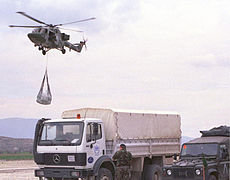
A helicopter arrives at a refugee facility in Macedonia with an underslung load of Aid
Trucks loaded with supplies drive across the border from Turkey into Iraq to take part in Operation Provide Comfort, a multinational effort to aid Kurdish refugees
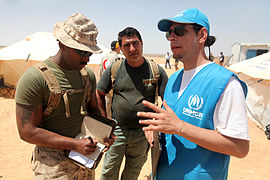
An UNHCR-officer talks with a Marine during Exercise Eager Lion 12

Workers from the UNHCR, and CARE International gather bundles of shelters and mosquito nets in Kenya
Heavily fortified UNHCR offices in Somaliland

A UNHCR refugee camp at Baharka - Iraq
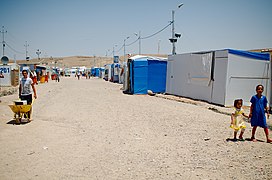
UNHCR Camp, Kurdistan (North-Iraq) June 2014
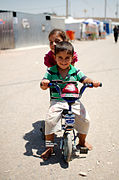
UNHCR Camp, Kurdistan (North-Iraq) June 2014
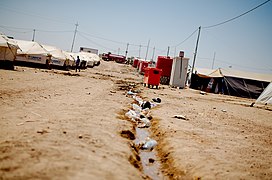
Inside the refugee camps of northern Iraq
Persons of concern to UNHCR
The UNHCR's Mid-Year Trends report of June 2015 (based on information for mid-2015 or latest available information up to that date) reported an "unprecedented" 57,959,702 individuals falling under its mandate (for reference, on January the 1st, 2007, 21,018,589 people - or less than half of the number in 2015 - fell under the mandate of the UNHCR). The sharp increase was mainly attributed to the Syrian Civil War, "with the outbreak of armed crises or the deterioration of ongoing ones in countries like Afghanistan, Burundi, Democratic Republic of the Congo, Mali, Somalia, South Sudan and the Ukraine contributing to prevailing trends."[17]
Persons of concern include refugees and asylum-seekers, people in refugee-like conditions, internally-displaced people (IDPs), stateless persons and "others of concern to the UNHCR".
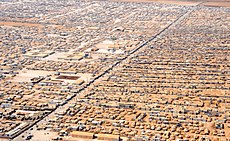
Aerial view of Zaatari refugee camp for Syrian refugees in Jordan, July 2013
Sorted by the UNHCR bureau in which asylum is sought, the number for June 2015 included:
- 16,796,426 in the Middle East and North Africa, of which
- 2,941,121 are refugees
- 64,166 are in refugee-like situations
- 109,847 have pending asylum cases
- 374,309 are stateless ("persons not considered as nationals by any State")
- 13,297,101 are IDPs or people in IDP-like situations assisted by the UNHCR
- 9,694,535 in the Asia and Pacific bureau, of which
- 3,506,644 are refugees
- 278,350 are in refugee-like situations
- 133,894 have pending asylum cases
- 1,801,802 are stateless ("persons not considered as nationals by any State")
- 2,965,211 are IDPs or people in IDP-like situations assisted by the UNHCR
- 8,451,275 in East and Horn of Africa, of which
- 2,713,748 are refugees
- 33,553 are in refugee-like situations
- 108,016 have pending asylum cases
- 233,726 are stateless ("persons not considered as nationals by any State"
- 5,119,463 are IDPs or people in IDP-like situations assisted by the UNHCR
- 7,726,594 in the Americas, of which
- 501,049 are refugees
- 251,888 are in refugee-like situations
- 276,394 have pending asylum cases
- 136,413 are stateless ("persons not considered as nationals by any State")
- 6,520,270 are IDPs or people in IDP-like situations assisted by the UNHCR
- 7,585,581 in Europe, of which
- 3,506,644 are refugees
- 14,261 are in refugee-like situations
- 827,374 are asylum-seekers
- 610,532 are stateless ("persons not considered as nationals by any State"
- 2,574,886 are IDPs or people in IDP-like situations assisted by the UNHCR
- 3,580,181 in Central Africa-Great Lakes, of which
- 865,112 are refugees
- 13,741 are in refugee-like situations
- 18,623 have pending asylum cases
- 1,302 are stateless ("persons not considered as nationals by any State"
- 2,021,269 are IDPs or people in IDP-like situations assisted by the UNHCR
- 2,754,893 in Western Africa of which
- 258,893 are refugees
- (Information not applicable/unavailable) on number in refugee-like situations
- 9,298 have pending asylum cases
- 700,116 are stateless ("persons not considered as nationals by any State")
- 1,549,516 are IDPs or people in IDP-like situations assisted by the UNHCR
- 1,370,217 in Southern Africa, of which
- 179,837 are refugees
- (Information not applicable/unavailable) on number in refugee-like situations
- 860,500 have pending asylum cases
- 300,000 are stateless ("persons not considered as nationals by any State")
- (Information not applicable/unavailable) on number of IDPs or people in IDP-like situations assisted by the UNHCR
Staffing

Filippo Grandi holds the post of High Commissioner since January 2016
As of April 2008[update], the UNHCR employed a staff of 6,351 people in 117 countries.[18][needs update]
High Commissioners
The UN General Assembly elects High Commissioners every five years. High Commissioners are supported by the 'Executive Committee to the High Commissioner’s Programme' and he or she has to make annual reports to the UN General Assembly and needs to follow their directives.[19] The current High Commissioner is Filippo Grandi, who has held the post since 1 January 2016.[20] Prior to the establishment of the UNHCR, Fridtjof Nansen was the League of Nations High Commissioner of the Nansen International Office for Refugees, from 1922. The post of High Commissioner has been held by:[21]
Fridtjof Nansen as the League of Nations' high commissioner for prisoners of war and refugees, during a stay in Sofia, where he discussed problems regarding the exchange of prisoners of war and refugees.
| № | High Commissioner | Took office | Left office | Time in office | Nationality | |
|---|---|---|---|---|---|---|
| 0 | Nansen, FridtjofFridtjof Nansen (1861–1930) League of Nations High Commissioner | 1922 | 1927 | 4–5 years | ||
| 1 | Goedhart, Gerrit Jan van HeuvenGerrit Jan van Heuven Goedhart (1901–1956) | 1 January 1951 | 8 July 1956 | 7003201500000000000♠5 years, 189 days | ||
| 2 | Lindt, August R.August R. Lindt (1905–2000) | 8 July 1956 | 3 November 1960 | 7003157900000000000♠4 years, 118 days | ||
| 3 | Schnyder, FélixFélix Schnyder (1910–1992) | 3 November 1960 | December 1965 | 5 years | ||
| 4 | Khan, Sadruddin AgaSadruddin Aga Khan (1933–2003) | December 1965 | 31 December 1977 | 12 years | ||
| 5 | Hartling, PoulPoul Hartling (1914–2000) | 1 January 1978 | 31 December 1985 | 7003292100000000000♠7 years, 364 days | ||
| 6 | Hocké, Jean-PierreJean-Pierre Hocké (born 1938) | 1 January 1986 | 31 December 1989 | 7003146000000000000♠3 years, 364 days | ||
| 7 | Stoltenberg, ThorvaldThorvald Stoltenberg (1931–2018) | 1 January 1990 | 3 November 1990 | 7002306000000000000♠306 days | ||
| 8 | Ogata, SadakoSadako Ogata (born 1927) | 3 November 1990 | 31 December 2000 | 7003371200000000000♠10 years, 59 days | ||
| 9 | Lubbers, RuudRuud Lubbers (1939–2018) (Resign due to internal investigation) | 1 January 2001 | 20 February 2005 | 7003151100000000000♠4 years, 50 days | ||
| - | Chamberlin, WendyWendy Chamberlin (born 1948) Acting | 24 February 2005 | 2 June 2005 | 7001980000000000000♠98 days | ||
| 10 | Guterres, AntónioAntónio Guterres (born 1949) | 2 June 2005 | 31 December 2015 | 7003386400000000000♠10 years, 212 days | ||
| 11 | Grandi, FilippoFilippo Grandi (born 1957) | 1 January 2016 | Incumbent | 7003107400000000000♠2 years, 343 days |
Special Envoy of High Commissioner Filippo Grandi
 Angelina Jolie
Angelina Jolie
After 10 years serving as a Goodwill Ambassador, Angelina Jolie was promoted in 2012 to Special Envoy to the High Commissioner. In this role she represents the UNHCR and High Commissioner Filipo Grandi at the diplomatic level and works to facilitate long-term solutions for people displaced by large-scale crises, such as Afghanistan and Somalia. "This is an exceptional position reflecting an exceptional role she has played for us," said a UNHCR spokesman.
Goodwill ambassadors
UNHCR is also represented by a number of UNHCR Goodwill Ambassadors, who at present are:

 Barbara Hendricks (Honorary Lifetime Goodwill Ambassador)
Barbara Hendricks (Honorary Lifetime Goodwill Ambassador)
 Cate Blanchett
Cate Blanchett
 David Morrissey
David Morrissey
 Neil Gaiman
Neil Gaiman
 Yao Chen
Yao Chen
 Julien Clerc
Julien Clerc
 George Dalaras
George Dalaras
 Alessandro Gassman
Alessandro Gassman
 Muazzez Ersoy
Muazzez Ersoy

 Khaled Hosseini
Khaled Hosseini
 Kristin Davis
Kristin Davis
 Adel Emam
Adel Emam
 Ger Duany
Ger Duany
 Rokia Traore
Rokia Traore
 Osvaldo Laport
Osvaldo Laport
 Jesús Vázquez
Jesús Vázquez

 Alek Wek
Alek Wek
 Jung Woo-sung
Jung Woo-sung
 Praya Lundberg
Praya Lundberg
 John Abraham
John Abraham
 Yusra Mardini
Yusra Mardini
 Sheikha Rima al-Sabah
Sheikha Rima al-Sabah

 Iskui Abalyan
Iskui Abalyan
Previous ambassadors include:
 Richard Burton
Richard Burton
 Nazia Hassan
Nazia Hassan
 James Mason
James Mason
 Sophia Loren
Sophia Loren
See also
- Against All Odds (video game)
- Nansen International Office for Refugees
- United Nations High Commissioner for Refugees Representation in Cyprus
- UNHCR Representation in India
Albert Einstein German Academic Refugee Initiative Fund, a scholarship program for refugees administered by UNHCR- United Nations Relief and Works Agency for Palestine Refugees in the Near East
- Dadaab
- Australia
Notes
^ UNDG Members Archived 11 May 2011 at the Wayback Machine.. Undg.org. Retrieved on 2013-07-12.
^ "Nobel Laureates Facts – Organizations". Nobel Foundation. Retrieved 2009-10-13..mw-parser-output cite.citation{font-style:inherit}.mw-parser-output q{quotes:"""""""'""'"}.mw-parser-output code.cs1-code{color:inherit;background:inherit;border:inherit;padding:inherit}.mw-parser-output .cs1-lock-free a{background:url("//upload.wikimedia.org/wikipedia/commons/thumb/6/65/Lock-green.svg/9px-Lock-green.svg.png")no-repeat;background-position:right .1em center}.mw-parser-output .cs1-lock-limited a,.mw-parser-output .cs1-lock-registration a{background:url("//upload.wikimedia.org/wikipedia/commons/thumb/d/d6/Lock-gray-alt-2.svg/9px-Lock-gray-alt-2.svg.png")no-repeat;background-position:right .1em center}.mw-parser-output .cs1-lock-subscription a{background:url("//upload.wikimedia.org/wikipedia/commons/thumb/a/aa/Lock-red-alt-2.svg/9px-Lock-red-alt-2.svg.png")no-repeat;background-position:right .1em center}.mw-parser-output .cs1-subscription,.mw-parser-output .cs1-registration{color:#555}.mw-parser-output .cs1-subscription span,.mw-parser-output .cs1-registration span{border-bottom:1px dotted;cursor:help}.mw-parser-output .cs1-hidden-error{display:none;font-size:100%}.mw-parser-output .cs1-visible-error{font-size:100%}.mw-parser-output .cs1-subscription,.mw-parser-output .cs1-registration,.mw-parser-output .cs1-format{font-size:95%}.mw-parser-output .cs1-kern-left,.mw-parser-output .cs1-kern-wl-left{padding-left:0.2em}.mw-parser-output .cs1-kern-right,.mw-parser-output .cs1-kern-wl-right{padding-right:0.2em}
^ abcdefghij Refworld | Self-Study Module 1: An Introduction to International Protection. Protecting Persons of Concern to UNHCR. Unhcr.org (1 August 2005). Retrieved on 2013-07-12.
^ "Convention relating to the Status of Refugees". www.ohchr.org. Retrieved 2016-09-29.
^ "History of UNHCR: A global humanitarian organization of humble origins". UNHCR. Retrieved 2009-11-01.
^ "Phones are now indispensable for refugees". The Economist. Retrieved 2017-02-20.
^ abc Refugees, United Nations High Commissioner for. "UNHCR and Caribbean partners work to raise awareness of "invisible" refugees". UNHCR. Retrieved 2016-11-16.
^ ab "UNHCR discuss plight of refugees in Caribbean". ftp.jamaicagleaner.com. Retrieved 2016-11-16.
^ ab Refugees, United Nations High Commissioner for. "Canadian-made refugee awareness campaign aims to shock". UNHCR. Retrieved 2016-11-16.
^ ab Refugees, United Nations High Commissioner for. "Building Awareness". www.unhcr.ie. Retrieved 2016-11-16.
^ "Summit for Refugees and Migrants - 19 September 2016". 2014-12-12. Retrieved 2016-09-29.
^ "New York Declaration for Refugees and Migrants". un.org. UN. Retrieved 8 November 2018.
^ "New York Declaration". un.org. UN. Retrieved 8 November 2018.
^ Section, United Nations News Service (2016-09-20). "UN News - UN official unveils draft principles on protecting human rights of refugees and migrants". UN News Service Section. Retrieved 2016-09-29.
^ "UNHCR and FAO help vulnerable refugees and South Sudanese families strengthen their food security". www.fao.org. Retrieved 2016-09-29.
^ Tecnologías, Developed with webControl CMS by Intermark. "UNHCR (United Nations High Comissioner for Refugees) - Laureates - Princess of Asturias Awards - The Princess of Asturias Foundation". The Princess of Asturias Foundation. Retrieved 2018-10-21.
^ Refugees, United Nations High Commissioner for. "Mid-Year Trends, June 2015". UNHCR. Retrieved 2016-02-27.
^ "Basic facts". UNHCR. Archived from the original on 24 September 2010. Retrieved 3 October 2010.
^ http://www.unhcr.org/46f7c0ee2.pdf |page12
^ "UN appoints Filippo Grandi as next high commissioner for refugees". The Guardian. London. 12 November 2015. Retrieved 27 November 2015.
^ "UNHCR Ehemalige FlüchtlingshochkommissarInnen" Archived 29 May 2015 at the Wayback Machine.. Retrieved 15 May 2015.
References
- Gil Loescher, Alexander Betts and James Milner. UNHCR: The Politics and Practice of Refugee Protection into the Twenty-First Century, Routledge. 2008.
- Alexander Betts. Protection by Persuasion: International Cooperation in the Refugee Regime, Cornell University Press. 2009.
- Gil Loescher. The UNHCR and World Politics: A Perilous Path. Oxford University Press. 2002
- Fiona Terry. Condemned to Repeat? The Paradox of Humanitarian Action. Cornell University Press. 2002.
- Nicholas Steiner. Problems of Protection. Routledge. 2003.
External links
| Wikimedia Commons has media related to UNHCR. |
- Official website
UNHCR's "Refworld" refugee document and news web site: from UNHCR's Status Determination and Protection Information Section (SDPIS) in the Division of International Protection Services (DIPS).- Bottled Water Program in Support of the UNHCR
- News from UNHCR official website
- "Basic facts" from official website
- Measuring Protection by Numbers, Report from official website
United Nations Rule of Law: The United Nations High Commissioner for Refugees, on the rule of law work conducted by the High Commissioner for Refugees.
History of the United Nations – UK Government site
"Who is a Refugee and who is not – the Crisis of Identity as a Challenge to Protection" Online video of an address by Ms. Erika Feller, director, Department of International Protection, UNHCR, in 2005- USCRI's Campaign to End Refugee Warehousing
- USCRI's joint Statement Calling for Solutions to End the Warehousing of Refugees
"Prisons of the Stateless: The Derelictions of UNHCR" by Jacob Stevens- Nine Million
- EarthWater





